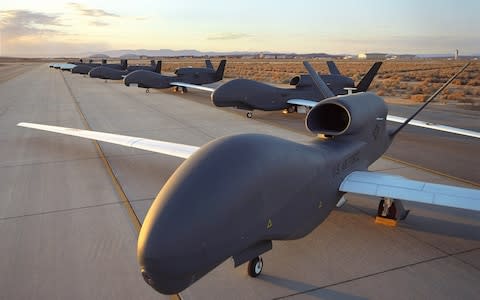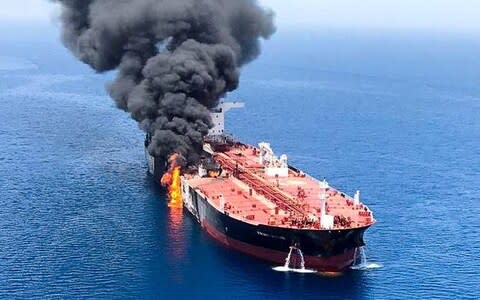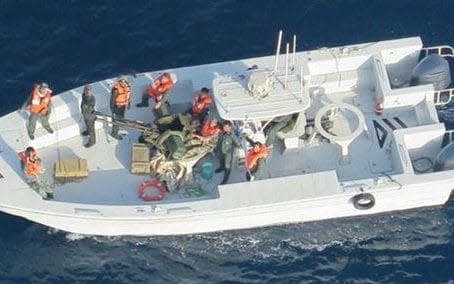Donald Trump 'approved strikes on Iran over downing of drone before aborting plan'

Donald Trump reportedly approved but then aborted strikes against Iranian targets on Thursday, after Iran shot down a US drone in what the president labelled a "big mistake."
The US was planning to hit "a handful of Iranian targets, like radar and missile batteries" on Thursday evening, the New York Times said, citing senior administration officials, but the plan was suddenly called off in its early stages.
White House and Pentagon officials declined to comment, the newspaper said, and it was unclear whether there were plans for such strikes to go forward in the future.
The report will fuel fears of a looming conflict in the region, where US airlines have been banned from flying through parts of Tehran-controlled airspace.
The United States confirmed that an RQ-4a surveillance drone had been shot down over the Gulf of Hormuz, but said it was over international waters when it was hit.
"Iranian reports that the aircraft was over Iran are false," the Pentagon said in a statement. "This was an unprovoked attack on a US surveillance asset in international airspace."
Mr Trump earlier declined to say how the United States would respond, telling reporters in Washington: "You will find out."
But he also played down Iranian government responsibility for the incident, saying he had a "big, big feeling" that the shoot down was a "mistake".
Speaking outside the White House, he said: "We didn't have a man or woman in the drone. It would have made a big, big difference." He added that it was probably someone "loose and stupid who did it."
With tensions rising, the US Federal Aviation Administration issued an emergency order prohibiting US operators from flying in an overwater area of Tehran-controlled airspace over the Strait of Hormuz and Gulf of Oman.
In a separate advisory to operators, FAA said according to flight tracking applications, the nearest civil aircraft was operating within around 45 nautical miles of the drone when it was shot down.
"There were numerous civil aviation aircraft operating in the area at the time of the intercept," FAA said.

The agency said it remained concerned about the escalation of tension and military activity within close proximity to high volume civil aircraft routes as well as Iran's willingness to use long-range missiles in international airspace with little or no warning.
United Airlines had already decided to suspend flights between New Jersey's Newark airport and the Indian financial capital of Mumbai following a safety review.
Earlier General Qasem Soleimani, the head of the Iran's Revolutionary Guard Corps, said the shoot down was intended as "a clear message" his country will defend itself.
Iran will "respond to all foreign aggression and our reaction is, and will be, categorical and absolute" he told the Tasnim news agency, which is controlled by the IRGC.
"We declare that we are not looking for war but we are ready to respond to any declaration of war," he added.

Last week two oil tankers were struck by mysterious explosions in the Gulf of Oman.
The United States accused Iran of using limpet mines to attack the ships on June 13. Iran has denied involvement, suggesting instead that regional rivals Saudi Arabia and the United Arab Emirates carried out the attack to lure Donald Trump into a war with Iran.
Adel al-Jubeir, the foreign minister of Saudi Arabia, called the accusation "absurd" and warned that America's Gulf allies were "determined to push back against Iran's aggressive behaviour."
"The idea of closing the Strait of Hormuz would generate a very strong reaction," he told journalists in London.
It was the second attack on tankers in the area in a month. In May four vessels suffered mysterious "sabotage" attacks that left them holed at the waterline.
The United States has also blamed Iranian-backed groups for a string of mortar and rocket attacks on US assets in Iraq. Saudi Arabia said Iranian-backed Houthi rebels in Yemen had fired a missile into the Kingdom overnight but caused no damage.

Military tensions have risen amid a diplomatic stand-off over the 2015 nuclear deal between Iran, Britain, China, France, Germany, the United States, and the European Union, which saw Iran curtail its nuclear program in exchange for sanctions relief.
Mr Trump pulled the United States out of the deal in 2018, saying it did not adequately restrict Iran's nuclear activities and failed to address concerns about its ballistic missile program and backing of proxy militias in Iraq, Yemen, and Lebanon.
In the year since, his administration has pursued a strategy of "maximum pressure" on the Iranian economy, including by trying to prevent third countries from buying Iranian oil.
Iran has said it will violate the agreement by producing more enriched uranium than the deal allows if the European signatories do not find a way for it to access oil revenues by June 27.
Iran's ambassador to London on Thursday said the Islamic Republic has so far seen "no concrete action" from European powers to meet that deadline.
Hamid Baeidinejad said Iran will not accept US demands to re-write the nuclear deal does not believe an offer by Donald Trump for direct talks is "sincere."

